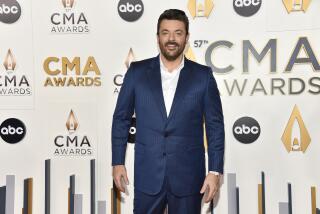Young Takes Stand, Denies Wrongdoing
Former Assemblyman Bruce Young took the stand at his political corruption trial in Los Angeles federal court Thursday and denied any wrongdoing in his dealings with convicted political fixer W. Patrick Moriarty and a Canadian cable television company.
Young, 40, apparently eager to tell his side, was urged by George Walker, one of his attorneys, at one point to “calm down” during his afternoon appearance in the federal government case. The former lawmaker is charged with 28 counts of mail fraud in connection with the failure to report income from Moriarty and the cable TV firm, Falcon Communications of Toronto.
Young, who left office in 1984 after representing the Norwalk area in the Assembly for eight years, denied the prosecution’s assertions that at the request of Assembly Speaker Willie Brown (D-San Francisco), he laundered Moriarty political contributions to half a dozen legislative candidates.
“There was no reason to do it (launder),” Young testified. “There was no reason to suspect it; no motive for it.”
Lawful political contributions, he asserted, are a fact of life in Sacramento politics. Politicians--Democrats and Republicans alike--were free to return money if they did not like the person who supplied it, he said. A truce in the heavy fund-raising activities by politicians in both parties is unlikely, he said, observing:
“It’s a political nuclear arms race. When you’re in the middle of a nuclear war with incoming missiles, it’s not the time to call an armistice.”
Young, a Democrat, also denied that he was guilty of any conflicts of interest while voting on proposed legislation affecting so-called “safe-and-sane” fireworks, as sought by Moriarty, then a fireworks manufacturer, and on other measures backed by the cable TV industry.
The former legislator gave long, rambling answers to pointed questions posed by federal prosecutor Richard Drooyan during cross-examination. At one point, U.S. District Judge Dickran Tevrizian Jr. asked Young and Drooyan to slow down so everyone in the courtroom could understand them.
“He (Young) has got a great deal at stake, and I’m going to try to calm him down,” Walker said outside of court.
Prosecutors charge that Young received free use of a leased Ford Bronco provided by Moriarty and 22 monthly payments of $1,000 from Falcon Communications. They also charge that the former legislator, now a Sacramento lobbyist, was illegally involved in a controversial $50,000 financial transaction with Moriarty.
Young testified that he voted on legislation affecting fireworks and the cable TV industry after he had been told by several legislative lawyers in Sacramento that no conflict of interest existed.
“As long as the legislation affected everyone (in those industries), there was no conflict,” he said.
He said his support for legislation for safe-and-sane fireworks was not so much for Moriarty as it was for his 63rd Assembly District in southeast Los Angeles County.
Young said fireworks was a “motherhood” issue in his district in the early 1980s, explaining that many charitable groups had asked for his support, saying that they earned revenue from fireworks sales.
Young took the stand in his own behalf after the judge denied defense motions to dismiss the government’s case against the former legislator.
Walker and co-counsel Alan Dressler had argued that the government had not proven its case on the 28 counts against Young, whose attorneys contended that he had not been influenced by the $22,000 that he received from the cable TV company.
But the judge replied, “He’s impaired because he received $22,000 in one year.”
More to Read
Get the L.A. Times Politics newsletter
Deeply reported insights into legislation, politics and policy from Sacramento, Washington and beyond. In your inbox three times per week.
You may occasionally receive promotional content from the Los Angeles Times.










